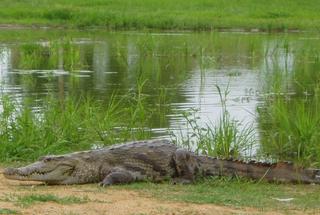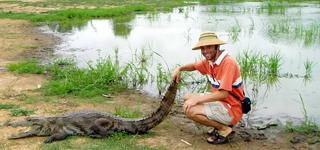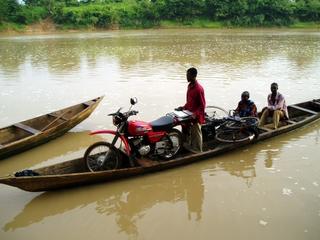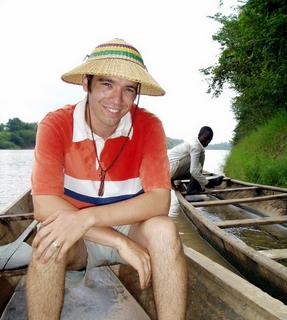Crocodiles, Hippos and Goats
Well, I have been able to get around a bit more in the last few weekends and with more of a sense of urgency. It is really starting to set in that I will soon be making my final preparations for coming back home and I am already starting to go into some pre-Ghana withdraw. Less than four weeks and I will be back on a plane to Canada.
Two weekends ago I got the chance to go to Paga, which is the majour northern border town between Ghana and Burkina Faso. Paga is also known for its sacred crocodiles. The trip up to Paga through Bolgatanga was relatively painless. Since it is a majour crossing point there are plenty of tro-tros going up to Bolga and Paga. I only had to wait about 45 minutes before our tro-tro from Tamale to Bolga left. In the time waiting I got the chance to do a bit of reading and also found a new great snack in the tro-tro station. I imagine it has been here all along but I just found it recently. It is shredded coconut that is some how stuck together in balls about the size of a Timbit. They are really very delicious and a nice little snack. The only difficulty is trying to find the woman with it on her head. So far I have only been able to find her around the tro-tro station. Anyways Bolga is about 2 hours from Tamale and Paga another 30 minutes from Bolga. The first day I spent in Bolga searching the town and looking through their market. Bolga is known for their basket weavers and I spent a bit of time looking at all their crafts (Bolga is where I got the weaved hat I nearly always wear the first time I went through it for work). While in Bolga I was once again reminded at how trusting and safe it is at least in the Northern Region. We stopped in a restaurant to look at the menu but decided it was a bit too pricey and moved on to another one about a 35-minute walk away. After the meal about 2 hours later I noticed that I had “lost” my digital camera. The last place I remember having it was at the first restaurant so in a slight panic (“oh man Erin is going to kill me”) I pay and rush out to get back to the first place before it closes. It is about 10pm by now which is pretty late for here. I get into the restaurant in about 20 minutes and it is nearly deserted except for a few people enjoying some drinks at the bar. Immediately, I move over to the table I was at to check but the camera is gone. I am certain I am a dead man. In a last hope I ask one of the workers if they found a camera I had forgotten and am relived by the smile and the “we were wondering when you would be back” as she directs me to behind the bar where my camera was placed for safekeeping. Once again I am overwhelmed by the honesty of the people here and this is only just one example of it.
had to wait about 45 minutes before our tro-tro from Tamale to Bolga left. In the time waiting I got the chance to do a bit of reading and also found a new great snack in the tro-tro station. I imagine it has been here all along but I just found it recently. It is shredded coconut that is some how stuck together in balls about the size of a Timbit. They are really very delicious and a nice little snack. The only difficulty is trying to find the woman with it on her head. So far I have only been able to find her around the tro-tro station. Anyways Bolga is about 2 hours from Tamale and Paga another 30 minutes from Bolga. The first day I spent in Bolga searching the town and looking through their market. Bolga is known for their basket weavers and I spent a bit of time looking at all their crafts (Bolga is where I got the weaved hat I nearly always wear the first time I went through it for work). While in Bolga I was once again reminded at how trusting and safe it is at least in the Northern Region. We stopped in a restaurant to look at the menu but decided it was a bit too pricey and moved on to another one about a 35-minute walk away. After the meal about 2 hours later I noticed that I had “lost” my digital camera. The last place I remember having it was at the first restaurant so in a slight panic (“oh man Erin is going to kill me”) I pay and rush out to get back to the first place before it closes. It is about 10pm by now which is pretty late for here. I get into the restaurant in about 20 minutes and it is nearly deserted except for a few people enjoying some drinks at the bar. Immediately, I move over to the table I was at to check but the camera is gone. I am certain I am a dead man. In a last hope I ask one of the workers if they found a camera I had forgotten and am relived by the smile and the “we were wondering when you would be back” as she directs me to behind the bar where my camera was placed for safekeeping. Once again I am overwhelmed by the honesty of the people here and this is only just one example of it.
The next day I head out to Paga to check out the “sacred” crocodiles. I’m not sure how it developed but apparently the people of Paga have a relationship with the crocodiles where they do not kill them and the crocs will not kill a person. Apparently if a person kills a crocodile then a crocodile will kill a person soon afterwards. Anyways, at the crocodile pool I pay for a fowl that is to be used as a lure to get the crocs out of the water. The guide brings us to the edge and shakes the chicken and a croc lumbers out onto dry land. I wonder if a crocodile has been murdered recently as the reptile pulls itself out of the water and the guide encourages me to get closer. The guide ensures that all is safe as long as you don’t stand in front of the croc. Shortly after I have moved behind and am picking up the croc’s tail.  Pretty cool experience for me but not so much for the fowl as the guide throws it into the air and the croc snaps his jaws on it. It turns and heads back into the water as I, still with the tail in hand, try and get out of his way. I spend the next little while walking around the pool and looking at some of the other crocodiles in the water and some guarding babies in the shallows. Afterwards, I check out some of the interesting housing, which in this more northerly part of the country are mostly square flat roofed mud buildings with painted walls. Overall holding the tail of a live crocodile pretty cool (even if it is habituated to people).
Pretty cool experience for me but not so much for the fowl as the guide throws it into the air and the croc snaps his jaws on it. It turns and heads back into the water as I, still with the tail in hand, try and get out of his way. I spend the next little while walking around the pool and looking at some of the other crocodiles in the water and some guarding babies in the shallows. Afterwards, I check out some of the interesting housing, which in this more northerly part of the country are mostly square flat roofed mud buildings with painted walls. Overall holding the tail of a live crocodile pretty cool (even if it is habituated to people).
Next weekend the EWB Tamale crew (myself included) move up to Wa in the North Western region to visit some other EWB volunteers and try and get a glimpse of some wild hippos. Wa was really nice and we had a great time despite not seeing any hippos. However the search for the hippos was half the fun of this part of the trip. In order to get to the village where the conservatory is established I needed to take a bush taxis. It is basically a pick up truck converted to carrying people and cargo. The box has wooden benches fasten to the sides and a metal cage over the top somewhat like a camper. It takes about 40 minutes to travel from Wa to the Weichau where the office of the sanctuary is. The actual river is another 18 km from Weichau. We opt for taking the more scenic option and rent bicycles to peddle to the river. The terrain is pretty nice and quiet and the cycle is not too strenuous. It takes about 70-80 minutes to peddle to the river. At the river there are some more dug out canoes which we take to look for hippos unfortunately they apparently have moved and we don’t see any but get to peddle back the 18 km now in the hot heat of mid day. Despite not actually seeing any hippos it was nice to get out and see the countryside and the paddle on the river was fun also. Luckily it is Weichau market day and there are plenty of bush taxis going back to Wa. Once in the market we find one that is nearly full and should leave shortly so I hope in. I get the seat closest to the tailgate and all things considered am pretty comfortable with the other 12 people in the back of the pickup with all their goods from the market. What is not crammed in the back with us the driver is trying to strap to the roof so we can leave.
It is at this point when I notice a man walking straight up to us dragging behind him about a dozen goats. Of course he is coming along and without the slightest hesitation he starts passing goats up to the driver on the top of the cage. In about ten minutes all the goats are somehow on the roof except for one, which apparently there is no more room for. After a few more minutes of shifting around and debating the driver decides that there is just enough room for the goat between my legs. Once again without hesitation he picks the goat up and plops him in the box square between my legs. Not too sure which end of the goat I would like facing me but relatively sure they don’t bite I go for the end with the horns. A few more minutes pass and the truck is off and on our way back to Wa. As the owner of the goats does not get into the back with us I assume he on the roof of the truck watching over his herd. Less than ten minutes into our trip back the truck has to stop as the engine is overheating. Apparently there is a leak in the radiator and we have to keep stopping to fill it up with water. At the second or third stop I figure I have had enough of the bumpy road and the wondering of when this goat was going to make his move for freedom by butting me his horns and making a break for it so I step out of the box and make my way up to the roof for some fresh air. It is way more comfortable up on the roof (if your not a goat of course). Along with the 11 goats (actually 10 goats and 1 sheep) there are several huge sacks of charcoal and some other large baskets and Mohammed the owner of the goats. As the radiator is getting topped up I notice a man from the village we stopped at quickly move to the truck and take my seat in the box and I soon realize that I riding the roof the remainder of the way back to Wa. All things considered I think that the roof is definitely the way to travel. Mohammed filed me in on some of the local scenery and customs and the fresh air and legroom was much appreciated. The key was watching the road ahead to look out for bumps in order to find something to hold on to. Considering I was sitting on a bag of charcoal and had 11 goats with me it was really enjoyable. Mohammed explained how he continuously moves between Wa and Accra (at least a 20 hour trip but probably more like 30 or 40) buying goats in the north and selling them in the south. He makes less than $6 per goat on a trip that can take him a few weeks before he returns. Overall he is lucky if he makes about $2-3 per day by my calculations while for the majority of the time he is away from his wife and kids who live in Wa. Overall I am really grateful for the time spent on top of the bush taxis with Mohamed and his 11 goats and his willingness to share his story with me. As we pull into Wa about an hour later because of all the stops I realize that this could be the last time, at least for a little while, where I could share the top of a pickup with 10 goats and a sheep. Of course as we pull into the town the driver tells us to get off the roof as the police might not like it so Mohamed and stand on the bumper and hang on to the cage for the ride from the outskirts to Wa’s tro-tro station. As we pull in I wish Mohamed good luck and see him off and realize once again that Ghana is great!
Take care and God Bless,
Jason




